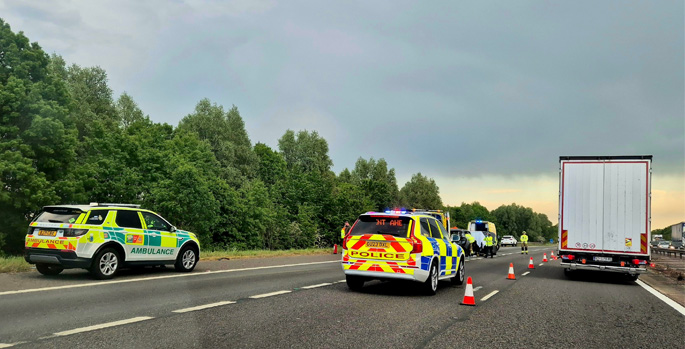Two-thirds of eCall activations are false alarms, according to a new report published by the RAC Foundation.
All new cars and vans sold in the UK since April 2018 have been fitted with eCall, a safety system that contacts emergency services to accelerate response times after vehicle collisions.
A new RAC report – Spoiler Alert: Is the eCall emergency alerting system fulfilling its road safety promise? – suggests the system, while very useful, needs to be refined as the vast majority of eCalls are false alarms, especially those triggered manually.
An eCall can either be triggered manually by vehicle occupants or, in the event of a serious crash, it can be triggered automatically, often by the deployment of a vehicle’s airbags, and make a 999 call.
It sends a standardised set of data to emergency responders, including vehicle type and location. At least 350,000 eCalls have been made by the system since 2018.
The RAC Foundation report found that over 85% of eCall alerts made in 2024 were triggered manually, with three-quarters of those shown to have been false alarms. Likewise, one-third of automated calls triggered by collisions in 2024 were shown to be false alarms.
In total, around two-thirds of all activations that year were unnecessary.
If this pattern has been the same since 2018, then some 230,000 of the 350,000 calls made to date will have been false alarms, the RAC Foundation found.
The report adds that, even if false alarms are reduced, the reliance on old 2G and 3G mobile networks that are being deactivated could still result in drivers having a system that doesn’t work.
The report also argues it would be beneficial to share the eCall information not just with emergency services, but also with organisations such as National Highways or other road authorities to enable them to manage traffic caused by incidents and notify road users of dangers more effectively.
Dr Nick Reed, the report author, said: ‘With the estimated potential to reduce road deaths by 5%, the case for accelerating the emergency response to road crashes through the eCall alert system is clear.
‘While the system has been successfully fitted to all new cars and light goods vehicles type-approved since April 2018, the report highlights that its effectiveness is being undermined by challenges in exploiting the data it provides and by a high rate of false alerts, often triggered by accidental misuse.'
Steve Gooding, director of the RAC Foundation, added: ‘eCall is a great idea. However, this report reveals a number of shortcomings in the system that need sorting, not least in the processes through which data is handled and the system’s historical reliance on old mobile phone networks that are being turned off. This requires urgent attention otherwise lives could be at risk from life-saving technology failing when it’s needed most.
‘The number of manually triggered false alarms also suggests the need for action to explain what is clearly still an unfamiliar system for many drivers.
‘One huge potential benefit is the use of eCall alongside, or instead of, stopped vehicle detection apparatus on the motorway network. There is understandable public and political concern about the dangers of vehicles breaking down in the live lanes of motorways, especially those sections that are all-lane running. eCall could help reduce those dangers by providing network managers with the swift, accurate notification that could save a bad situation turning into a catastrophe.’
Image credit: Pradeep Thomas Thundiyil / Shutterstock.com






